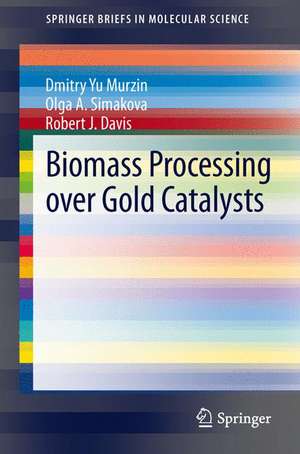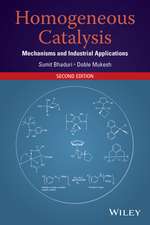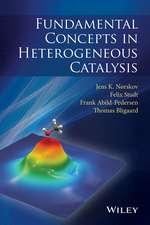Biomass Processing over Gold Catalysts: SpringerBriefs in Molecular Science
Autor Olga A. Simakova, Robert J. Davis, Dmitry Yu Murzinen Limba Engleză Paperback – 29 iul 2013
Since biomass is a rich renewable feedstock for diverse platform molecules, including those currently derived from petroleum, the interest in various transformation routes has become intense. Catalytic conversion of biomass is one of the main approaches to improving the economic viability of biorefineries. In addition, Gold catalysts were found to have outstanding activity and selectivity in many key reactions.
This book collects information about transformations of the most promising and important compounds derived from cellulose, hemicelluloses, and woody biomass extractives. Since gold catalysts possess high stability under oxidative conditions, selective oxidation reactions were discussed more thoroughly than other critical reactions such as partial hydrogenation, acetalization, and isomerization.
The influence of reaction conditions, the role of the catalyst, and the advantages and disadvantages of using gold are presented for all of the reactions mentioned above.
This book provides an overview of the recent research results focusing on application of gold catalysts for synthesis of valuable chemicals using renewable feedstocks.
Din seria SpringerBriefs in Molecular Science
-
 Preț: 411.46 lei
Preț: 411.46 lei -
 Preț: 379.09 lei
Preț: 379.09 lei -
 Preț: 356.49 lei
Preț: 356.49 lei -
 Preț: 441.25 lei
Preț: 441.25 lei -
 Preț: 389.70 lei
Preț: 389.70 lei -
 Preț: 376.22 lei
Preț: 376.22 lei -
 Preț: 348.77 lei
Preț: 348.77 lei -
 Preț: 345.14 lei
Preț: 345.14 lei -
 Preț: 347.69 lei
Preț: 347.69 lei -
 Preț: 346.70 lei
Preț: 346.70 lei -
 Preț: 376.43 lei
Preț: 376.43 lei -
 Preț: 342.14 lei
Preț: 342.14 lei -
 Preț: 375.23 lei
Preț: 375.23 lei -
 Preț: 379.09 lei
Preț: 379.09 lei -
 Preț: 376.59 lei
Preț: 376.59 lei - 15%
 Preț: 461.73 lei
Preț: 461.73 lei -
 Preț: 378.12 lei
Preț: 378.12 lei -
 Preț: 376.59 lei
Preț: 376.59 lei -
 Preț: 376.59 lei
Preț: 376.59 lei -
 Preț: 375.23 lei
Preț: 375.23 lei -
 Preț: 351.18 lei
Preț: 351.18 lei -
 Preț: 377.73 lei
Preț: 377.73 lei -
 Preț: 372.73 lei
Preț: 372.73 lei -
 Preț: 378.54 lei
Preț: 378.54 lei -
 Preț: 376.96 lei
Preț: 376.96 lei -
 Preț: 377.35 lei
Preț: 377.35 lei -
 Preț: 378.12 lei
Preț: 378.12 lei -
 Preț: 376.04 lei
Preț: 376.04 lei -
 Preț: 346.59 lei
Preț: 346.59 lei -
 Preț: 375.45 lei
Preț: 375.45 lei -
 Preț: 377.73 lei
Preț: 377.73 lei -
 Preț: 381.00 lei
Preț: 381.00 lei -
 Preț: 377.18 lei
Preț: 377.18 lei -
 Preț: 376.96 lei
Preț: 376.96 lei -
 Preț: 380.07 lei
Preț: 380.07 lei -
 Preț: 376.22 lei
Preț: 376.22 lei -
 Preț: 343.72 lei
Preț: 343.72 lei -
 Preț: 376.22 lei
Preț: 376.22 lei -
 Preț: 377.35 lei
Preț: 377.35 lei -
 Preț: 343.72 lei
Preț: 343.72 lei -
 Preț: 376.22 lei
Preț: 376.22 lei -
 Preț: 375.07 lei
Preț: 375.07 lei -
 Preț: 374.85 lei
Preț: 374.85 lei - 15%
 Preț: 464.97 lei
Preț: 464.97 lei -
 Preț: 376.43 lei
Preț: 376.43 lei -
 Preț: 341.75 lei
Preț: 341.75 lei -
 Preț: 374.30 lei
Preț: 374.30 lei -
 Preț: 375.23 lei
Preț: 375.23 lei -
 Preț: 377.57 lei
Preț: 377.57 lei
Preț: 375.23 lei
Nou
Puncte Express: 563
Preț estimativ în valută:
71.81€ • 74.69$ • 59.28£
71.81€ • 74.69$ • 59.28£
Carte tipărită la comandă
Livrare economică 14-28 aprilie
Preluare comenzi: 021 569.72.76
Specificații
ISBN-13: 9783319009056
ISBN-10: 3319009052
Pagini: 64
Ilustrații: VIII, 54 p. 24 illus., 7 illus. in color.
Dimensiuni: 155 x 235 x 3 mm
Greutate: 0.11 kg
Ediția:2013
Editura: Springer International Publishing
Colecția Springer
Seria SpringerBriefs in Molecular Science
Locul publicării:Cham, Switzerland
ISBN-10: 3319009052
Pagini: 64
Ilustrații: VIII, 54 p. 24 illus., 7 illus. in color.
Dimensiuni: 155 x 235 x 3 mm
Greutate: 0.11 kg
Ediția:2013
Editura: Springer International Publishing
Colecția Springer
Seria SpringerBriefs in Molecular Science
Locul publicării:Cham, Switzerland
Public țintă
ResearchCuprins
Introduction.- Selective Oxidation/Dehydrogenation Reactions.- Acetalization.- N-alkylation.- Selective Hydrogenation Reactions.- Double Bond Oxidation Reactions.- Isomerization Reactions.- Gold Catalysts Stability.- Summary.
Notă biografică
Prof. Robert Davis obtained his Ph.D. degree in Chemical Engineering from Stanford University in 1989, and did postdoctoral research in the Chemistry Department at the University of Namur in Belgium. He joined the faculty in Chemical Engineering at the University of Virginia in 1990 as an assistant professor, was promoted to associate professor in 1996, and full professor in 2002. Professor Davis also served as the Chair of Chemical Engineering at the University of Virginia from 2002 to 2011.
Prof. Dmitry Yu. Murzin received his Ph.D. and Dr. Sc. at Karpov Institute of Physical Chemistry in Moscow and worked for BASF in Germany and Russia. At present he is Chaired Professor in Chemical Technology at Åbo Akademi University, Finland.
Dr. Olga A. Simakova received her Ph.D. degree in Chemical Engineering from Åbo Akademi University in Finland in 2012. At present, she is a postdoctoral research fellow in the School of Chemical and Biomolecular Engineering at Georgia Institute of Technology, USA.
Prof. Dmitry Yu. Murzin received his Ph.D. and Dr. Sc. at Karpov Institute of Physical Chemistry in Moscow and worked for BASF in Germany and Russia. At present he is Chaired Professor in Chemical Technology at Åbo Akademi University, Finland.
Dr. Olga A. Simakova received her Ph.D. degree in Chemical Engineering from Åbo Akademi University in Finland in 2012. At present, she is a postdoctoral research fellow in the School of Chemical and Biomolecular Engineering at Georgia Institute of Technology, USA.
Textul de pe ultima copertă
The book describes the valorization of biomass-derived compounds over gold catalysts.
Since biomass is a rich renewable feedstock for diverse platform molecules, including those currently derived from petroleum, the interest in various transformation routes has become intense. Catalytic conversion of biomass is one of the main approaches to improving the economic viability of biorefineries. In addition, Gold catalysts were found to have outstanding activity and selectivity in many key reactions.
This book collects information about transformations of the most promising and important compounds derived from cellulose, hemicelluloses, and woody biomass extractives. Since gold catalysts possess high stability under oxidative conditions, selective oxidation reactions were discussed more thoroughly than other critical reactions such as partial hydrogenation, acetalization, and isomerization.
The influence of reaction conditions, the role of the catalyst, and the advantages and disadvantages of using gold are presented for all of the reactions mentioned above.
This book provides an overview of the recent research results focusing on application of gold catalysts for synthesis of valuable chemicals using renewable feedstocks.
Since biomass is a rich renewable feedstock for diverse platform molecules, including those currently derived from petroleum, the interest in various transformation routes has become intense. Catalytic conversion of biomass is one of the main approaches to improving the economic viability of biorefineries. In addition, Gold catalysts were found to have outstanding activity and selectivity in many key reactions.
This book collects information about transformations of the most promising and important compounds derived from cellulose, hemicelluloses, and woody biomass extractives. Since gold catalysts possess high stability under oxidative conditions, selective oxidation reactions were discussed more thoroughly than other critical reactions such as partial hydrogenation, acetalization, and isomerization.
The influence of reaction conditions, the role of the catalyst, and the advantages and disadvantages of using gold are presented for all of the reactions mentioned above.
This book provides an overview of the recent research results focusing on application of gold catalysts for synthesis of valuable chemicals using renewable feedstocks.
Caracteristici
Applies gold catalysis to biomass-derived substrate conversion Includes supplementary material: sn.pub/extras





